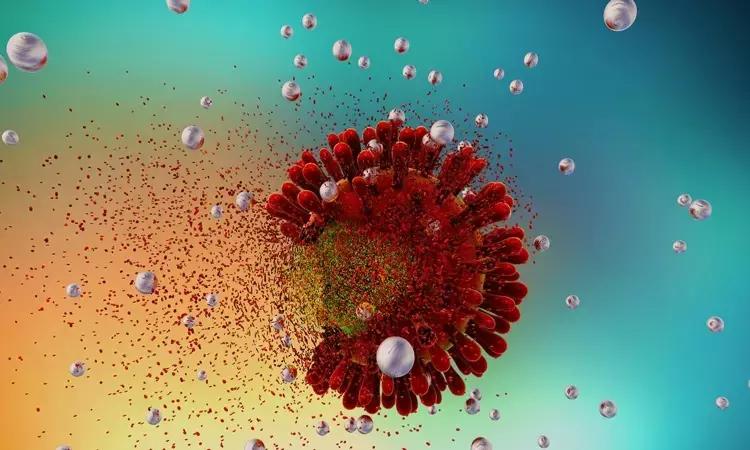- Home
- Medical news & Guidelines
- Anesthesiology
- Cardiology and CTVS
- Critical Care
- Dentistry
- Dermatology
- Diabetes and Endocrinology
- ENT
- Gastroenterology
- Medicine
- Nephrology
- Neurology
- Obstretics-Gynaecology
- Oncology
- Ophthalmology
- Orthopaedics
- Pediatrics-Neonatology
- Psychiatry
- Pulmonology
- Radiology
- Surgery
- Urology
- Laboratory Medicine
- Diet
- Nursing
- Paramedical
- Physiotherapy
- Health news
- Fact Check
- Bone Health Fact Check
- Brain Health Fact Check
- Cancer Related Fact Check
- Child Care Fact Check
- Dental and oral health fact check
- Diabetes and metabolic health fact check
- Diet and Nutrition Fact Check
- Eye and ENT Care Fact Check
- Fitness fact check
- Gut health fact check
- Heart health fact check
- Kidney health fact check
- Medical education fact check
- Men's health fact check
- Respiratory fact check
- Skin and hair care fact check
- Vaccine and Immunization fact check
- Women's health fact check
- AYUSH
- State News
- Andaman and Nicobar Islands
- Andhra Pradesh
- Arunachal Pradesh
- Assam
- Bihar
- Chandigarh
- Chattisgarh
- Dadra and Nagar Haveli
- Daman and Diu
- Delhi
- Goa
- Gujarat
- Haryana
- Himachal Pradesh
- Jammu & Kashmir
- Jharkhand
- Karnataka
- Kerala
- Ladakh
- Lakshadweep
- Madhya Pradesh
- Maharashtra
- Manipur
- Meghalaya
- Mizoram
- Nagaland
- Odisha
- Puducherry
- Punjab
- Rajasthan
- Sikkim
- Tamil Nadu
- Telangana
- Tripura
- Uttar Pradesh
- Uttrakhand
- West Bengal
- Medical Education
- Industry
'Breakthrough' treatment slashes virus death risk: study

An aerosol-based drug treatment could drastically reduce the number of new coronavirus patients dying from the disease or requiring intensive care, according to preliminary results released Monday by a British biotech firm.
In a randomised trial of 100 patients admitted to hospital with COVID-19, those who received an inhaled formula of the protein interferon beta were at 79 percent lower risk of developing severe disease compared to those who received a placebo.
They were also more than twice as likely to make a full recovery compared with the control group.
The firm behind the treatment, known as SNG001, said the preliminary results suggested "a major breakthrough" in the pandemic.
"We are all delighted with the trial results announced today, which showed that SNG001 greatly reduced the number of hospitalised COVID-19 patients who progressed from requiring oxygen to requiring ventilation," said Richard Marsden, CEO of Synairgen.
The results published Monday have not yet been peer-reviewed and the sample size is relatively small.
But if confirmed the treatment could revolutionise the way COVID-19 is dealt with in hospitals.
Interferon beta is a naturally occurring protein, commonly used to treat multiple sclerosis.
It forms part of the body's natural fight against infection, and the novel coronavirus suppresses its production in an attempt to evade an immune response.
Delivering the protein directly into the lungs of patients is designed to trigger a robust immune response to the virus, even in patients whose immune system is already weakened by infection.
"The results confirm our belief that interferon beta... has huge potential as an inhaled drug to be able to restore the lung's immune response," said Tom Wilkinson, professor or respiratory medicine at the University of Southampton.
He said the trial showed SNG001 was effective in "enhancing protection, accelerating recover and countering the impact of SARS-CoV-2 virus."
There are currently a number of treatments available for patients hospitalised with COVID-19.
Last month a Britain-based team of researchers lead by the University of Oxford announced they had successfully reduced the risk of death among seriously ill patients by administering the commonly available steroid dexamethasone.
Several countries have also issued the emergency authorisation for treatment with anti-viral remdesivir.
Hina Zahid Joined Medical Dialogue in 2017 with a passion to work as a Reporter. She coordinates with various national and international journals and association and covers all the stories related to Medical guidelines, Medical Journals, rare medical surgeries as well as all the updates in the medical field. Email: editorial@medicaldialogues.in. Contact no. 011-43720751
Dr Kamal Kant Kohli-MBBS, DTCD- a chest specialist with more than 30 years of practice and a flair for writing clinical articles, Dr Kamal Kant Kohli joined Medical Dialogues as a Chief Editor of Medical News. Besides writing articles, as an editor, he proofreads and verifies all the medical content published on Medical Dialogues including those coming from journals, studies,medical conferences,guidelines etc. Email: drkohli@medicaldialogues.in. Contact no. 011-43720751


